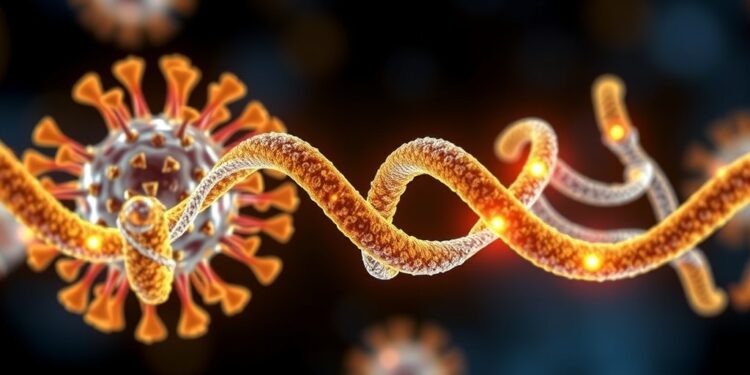
In a groundbreaking study published in Nature Neuroscience, researchers have uncovered a biochemical link that may explain why some individuals manifest symptoms of anxiety and depression when faced with chronic stress, while others demonstrate remarkable resilience. This research centers on a specific protein known as cannabinoid receptor type 1 (CB1), which is situated within the blood-brain barrier. This intricate structure serves as a regulatory gatekeeper, determining what substances enter the brain from the bloodstream. The findings hint at a potential pathway for developing new therapeutic strategies to bolster mental resilience in the face of stress.
The blood-brain barrier plays a crucial role in maintaining the delicate environment of the brain, and its integrity is essential for mental health. Stress, particularly chronic social stress, has been shown to disrupt this barrier, allowing inflammatory substances to infiltrate the central nervous system. This infiltration can trigger a cascade of neurobiological events leading to symptoms of anxiety and depression. Professor Caroline Ménard, the lead researcher from Université Laval’s Faculty of Medicine, emphasizes that the presence and function of CB1 receptors within the barrier may influence how effectively the brain can respond to stress.
Ménard and her team observed that resilient mice exhibited a notably higher density of CB1 receptors in their astrocytes—star-shaped glial cells that support neurons—compared to those exhibiting depressive-like behaviors. This was a pivotal observation, as it suggested that the quantity of CB1 receptors in astrocytes may be a determining factor in whether an individual can withstand social stress without succumbing to mental health issues. Astrocytes, because of their critical position at the interface of blood vessels and neurons, can play a protective role when their function is augmented.
To further investigate the significance of astrocytic CB1 receptors, the researchers employed a method that artificially increased the abundance of these receptors in mouse astrocytes. They utilized a viral vector to deliver genetic material specifically targeting these cells, allowing for a focused investigation on the role of CB1 in the context of chronic stress. Following injections, these mice were exposed to a regimen of psychosocial stress involving confrontation with a dominant mouse, simulating social hierarchies and aggression that could evoke stress and anxiety.
Remarkably, the mice with enhanced CB1 receptor levels showed promising results. Not only were their baseline anxiety levels lower, but they also demonstrated a marked reduction in stress-induced anxiety and depressive behaviors. By promoting vascular health within the brain, the overexpression of CB1 receptors appeared to cultivate conditions that favored resilience. Such findings underscore the potential of mechanistically targeting the endocannabinoid system as a means to bolster mental health in the face of adversity.
In addition to the mouse experiments, human brain samples from the Douglas-Bell Canada Brain Bank provided further evidence supporting the study’s conclusions. Analysis revealed that individuals diagnosed with major depression exhibited significantly reduced levels of CB1 receptors in their astrocytes compared to healthy individuals and those receiving antidepressant treatment. This correlation draws a compelling link between reduced cannabinoid receptor activity in the brain and the presence of depressive symptoms, highlighting a possible target for future pharmacological interventions.
While the therapeutic potential of cannabinoid receptor agonists in astrocytes is tantalizing, Ménard cautions against indiscriminate activation of these receptors in neurons. Such stimulation could yield undesirable side effects, complicating the balance needed to improve mental health outcomes without adversely affecting alertness, appetite, and overall well-being. As researchers navigate this complex terrain, the focus remains on identifying specific molecules capable of selectively activating CB1 receptors within astrocytes.
In tandem with genetic engineering, other stimuli such as physical exercise and the administration of antidepressants have also been shown to elevate CB1 receptor levels in astrocytes. This connection highlights the multifaceted approaches needed to address mental health challenges, emphasizing a holistic understanding of the interplay between physical activity and neurobiological pathways involved in stress and depression.
Considering the pervasive nature of anxiety and depressive disorders, which affect millions globally, the implications of these findings cannot be overstated. By unveiling the mechanisms that underlie resilience, researchers are paving the way for novel treatments that may empower individuals to withstand the pressures of modern life. Future research will undoubtedly continue to explore the therapeutic window offered by cannabinoids, personalized interventions, and holistic health strategies to fortify mental resilience in diverse populations.
As the scientific community delves deeper into the neurobiology of stress resilience, the urgency for innovative approaches to mental health care intensifies. By tailoring treatments to the unique biochemical profiles of individuals, there is the potential to not only mitigate the potential fallout from chronic stress but also to foster an environment that enables individuals to thrive. The path forward will involve a combination of basic science, clinical investigations, and applications across societal settings to holistically address the challenges presented by mental health disorders.
In conclusion, the research unveiled in Nature Neuroscience carries profound implications for mental health treatment and chronic stress adaptation. As scientists continue to decode the intricacies of the brain’s protective mechanisms, the hope is that effective and targeted interventions can emerge, providing relief and bolstering resilience in those grappling with the debilitating effects of anxiety and depression.
Subject of Research: Animals
Article Title: Astrocytic cannabinoid receptor 1 promotes resilience by dampening stress-induced blood–brain barrier alterations
News Publication Date: 27-Feb-2025
Web References: DOI
References: Nature Neuroscience
Image Credits: Université Laval
Tags: anxiety and depression mechanismsbiochemical pathways in stress responseblood-brain barrier integritycannabinoid receptor type 1chronic stress effectsinflammatory substances and CNSneurobiological response to stressProfessor Caroline Ménard research findingsprotein linked to stress resilienceresearch in neuroscienceresilience in mental healththerapeutic strategies for mental health





